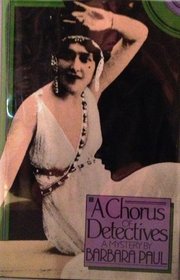Helpful Score: 1
I've always loved and re-read Barbara Paul's very short series of Golden Opera Age cozies. The mysteries are usually slight, and if judged as mysteries, fail miserably. The killer always takes a back seat and is revealed in one of those moments that Lionel Twain derides in "Murder By Death."
Instead, what has always made these books fun is the cast of amateur detectives, the most glittering names on the 1910s Metropolitan Opera roster. Farrar, Caruso, Scotti, Amato, Destinn, and their boss Gatti-Casazza. The characterizations are guaranteed to be way out of whack, but whatever. It's still fun. I'm predisposed to like these books anyway because I've collected the recordings of these artists and they're as well-played on my ipod as anything of more recent years.
While the other two opera books of Paul's are light-hearted and fun, this one had a more somber tone, and throughout I often felt more sad than amused. It's 1920, and Amato's voice isn't what it once was (his 1921 recordings attest to that). Farrar has the young and sexy specter of Maria Jeritza looming over her shoulder for the next season. Caruso has to share roles with new arrival Beniamino Gigli while suffering ill health. He hemorrhages blood during a performance of L'Elisir d'Amore and his condition a topic of conversation among the others throughout the book. Destinn is changed by her wartime house arrest on her Czech estate, bitter and apathetic. The gay and frivolous pre-war theater world is gone forever, and a scene between Farrar and David Belasco emphasizes the theme of this book, which is about final curtains and graceful retirements after years of fierce dedication and stardom.
So the peppy, fun reads of Prima Donna At Large and A Cadenza For Caruso don't apply to this last installment, but if one has an affection for the era and its celebrities, then this book doesn't disappoint.
Instead, what has always made these books fun is the cast of amateur detectives, the most glittering names on the 1910s Metropolitan Opera roster. Farrar, Caruso, Scotti, Amato, Destinn, and their boss Gatti-Casazza. The characterizations are guaranteed to be way out of whack, but whatever. It's still fun. I'm predisposed to like these books anyway because I've collected the recordings of these artists and they're as well-played on my ipod as anything of more recent years.
While the other two opera books of Paul's are light-hearted and fun, this one had a more somber tone, and throughout I often felt more sad than amused. It's 1920, and Amato's voice isn't what it once was (his 1921 recordings attest to that). Farrar has the young and sexy specter of Maria Jeritza looming over her shoulder for the next season. Caruso has to share roles with new arrival Beniamino Gigli while suffering ill health. He hemorrhages blood during a performance of L'Elisir d'Amore and his condition a topic of conversation among the others throughout the book. Destinn is changed by her wartime house arrest on her Czech estate, bitter and apathetic. The gay and frivolous pre-war theater world is gone forever, and a scene between Farrar and David Belasco emphasizes the theme of this book, which is about final curtains and graceful retirements after years of fierce dedication and stardom.
So the peppy, fun reads of Prima Donna At Large and A Cadenza For Caruso don't apply to this last installment, but if one has an affection for the era and its celebrities, then this book doesn't disappoint.




